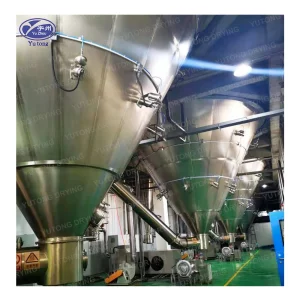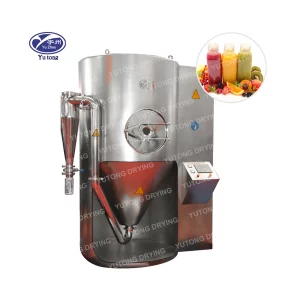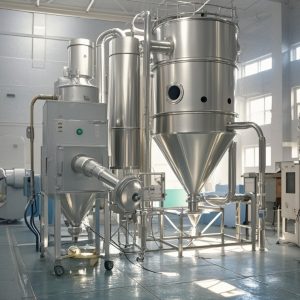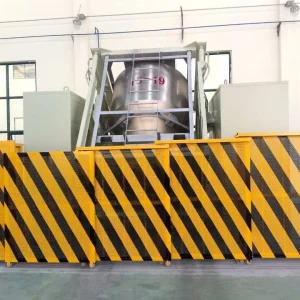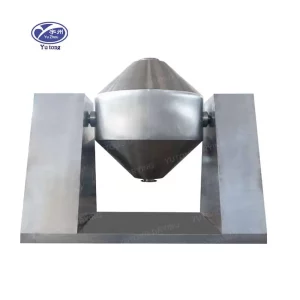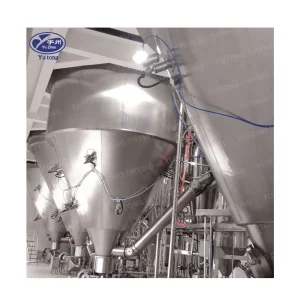Spray drying is a widely used method in various industries for converting liquid substances into dry powders. This process involves atomizing a liquid feed into fine droplets and then rapidly drying these droplets using hot air. The resulting powder has several advantages, such as improved stability, easier handling, and longer shelf life. In this article, we will explore some examples of spray drying in different fields.
1. Food Industry
In the food industry, spray drying is commonly used to produce a variety of powdered products. For example:
Milk Powder: Spray drying is extensively used to convert liquid milk into milk powder. This powder can be easily stored and transported, and it has a long shelf life. Milk powder is used in various applications such as infant formula, baking, and beverage preparation.
Instant Coffee: Coffee extract is spray dried to produce instant coffee powder. This powder dissolves quickly in hot water, making it convenient for consumers. Spray drying helps preserve the flavor and aroma of coffee.
Fruit Powders: Fruits such as berries, mangoes, and bananas can be processed into powders by spray drying. These fruit powders can be used in snacks, smoothies, and as ingredients in bakery products. They retain some of the nutritional value of the fresh fruits.
Dairy Products: Spray drying is also used to produce powdered cheese, whey protein, and other dairy products. These powders are used in food formulations and as nutritional supplements.
2. Pharmaceutical Industry
In the pharmaceutical industry, spray drying is employed to produce drug formulations and excipients. Some examples include:
Drug Powders: Active pharmaceutical ingredients (APIs) can be spray dried to form fine powders. These powders can be used in tablet formulations, inhalers, and other drug delivery systems. Spray drying helps improve the solubility and bioavailability of drugs.
Stabilized Proteins: Proteins and peptides can be spray dried to produce stable powders. This is important for drugs that are sensitive to degradation. Spray drying can also be used to encapsulate proteins and protect them from environmental factors.
Excipients: Spray drying is used to produce excipients such as lactose, mannitol, and starch. These excipients are used in drug formulations to improve flow properties, compressibility, and stability.
3. Chemical Industry
The chemical industry also makes use of spray drying for various applications. Here are some examples:
Detergent Powders: Liquid detergents can be spray dried to produce powdered detergents. These powders have better storage stability and are easier to package and transport. Spray drying helps control the particle size and shape of the detergent powder.
Catalysts: Spray drying is used to produce catalysts in powder form. These catalysts are used in chemical reactions to increase reaction rates and selectivity. Spray drying can help control the porosity and surface area of the catalysts.
Ceramic Powders: Ceramic materials can be processed into powders by spray drying. These powders are used in the production of ceramics, such as pottery, tiles, and advanced ceramics. Spray drying helps control the particle size and distribution of the ceramic powder.
4. Other Industries
Spray drying is also used in other industries, such as cosmetics and agriculture. Some examples include:
Cosmetics: Spray drying is used to produce powders for cosmetics such as face powders, eye shadows, and blushes. These powders have a smooth texture and good adhesion. Spray drying can also be used to encapsulate active ingredients in cosmetics.
Agricultural Chemicals: Pesticides and fertilizers can be spray dried to produce powders. These powders are easier to handle and apply than liquid formulations. Spray drying can help control the release rate of the active ingredients.
In conclusion, spray drying is a versatile technique that is widely used in various industries. The examples mentioned above demonstrate the broad range of applications of spray drying in producing powdered products with specific properties and advantages. Whether it’s in the food, pharmaceutical, chemical, or other industries, spray drying plays an important role in meeting the needs of different sectors.

